[Color Computer, Shards Software]
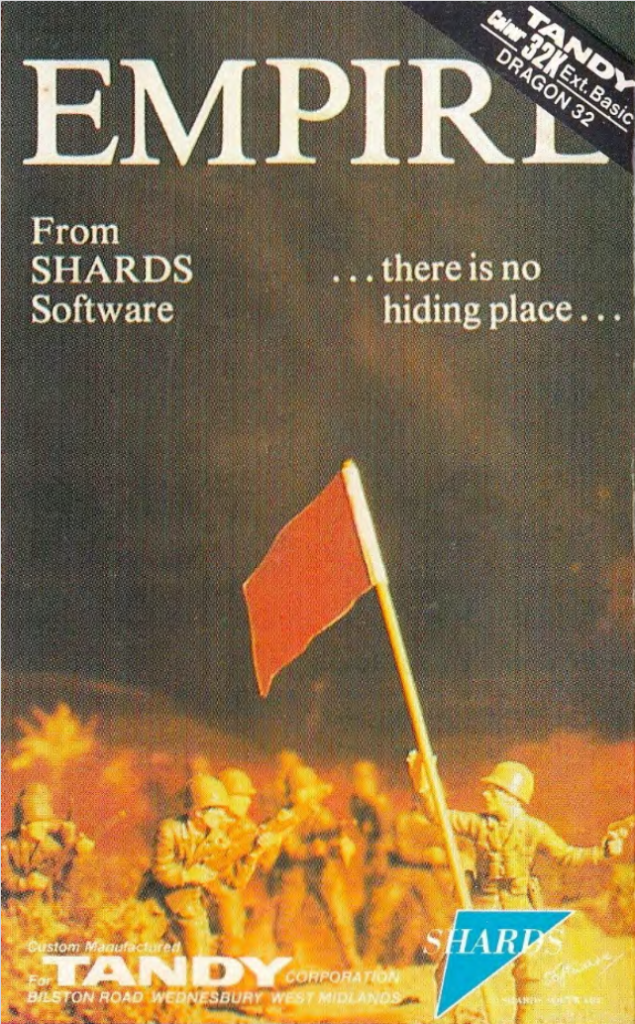
Empire by Shards Software is – spoiler – a blatant rip-off of Risk featuring 3 players:
- You,
- A computer-controlled opponent playing the role of an 8-year-old. He called his Empire the “Dragon Empire” and attacks every turn without any consideration for odds or strategy,
- A computer-controlled opponent playing the role of the person who went to buy cigarettes and never came back when you told him you were going to play Risk with an 8-year-old. He is called “neutral” in-game.
The first part of the game is about allocating the 39 starting regions. 13 of them start “neutral”, and you and the airquote “Dragon Empire” alternate to pick one of the remaining countries. As there were few neutrals in the Americas and in Africa in my session, I focused there, while the Dragon Empire went full random.

After that, the players must allocate 26 “reinforcements”. With only one hostile territory in South America and 2 in Africa, I deploy the bulk of my forces there. The Neutrals and the Dragon Empire deploy their reinforcements after me, and overall they spread out their forces randomly rather than concentrate somewhere useful.

The Dragon Empire plays first. After one attack on a neutral territory in Oceania, it decides to attack me in Africa :

The Dragon Empire attacks with 11 Attackers (ATT) against my 10 Defenders. That’s not enough of an advantage, and it is defeated. When a player is defeated, their turn immediately ends. The neutral player is inactive, so it is now my turn. I have some reinforcements that I deploy in Africa, and I use my turn to completely liberate two continents, giving me a significant recruitment bonus in the future.

Each continent gives +5 reinforcements every turn, each victory gives +1 reinforcement every turn.
The following turns, the Dragon Empire expands in Asia and Oceania but fails to control either completely. Meanwhile, I finalize my conquest of North America. The only reason it takes me two turns is that, unlike in Risk, you cannot move from Quebec to Greenland – something of course not communicated anywhere in the game. I ended up with a bunch of useless units in Quebec at the end of the second turn. During the third turn, I push through Greenland and then reach… Iceland? The Faeroes? Vikna? Svalbard? The long-lost Atlantide? I don’t know.
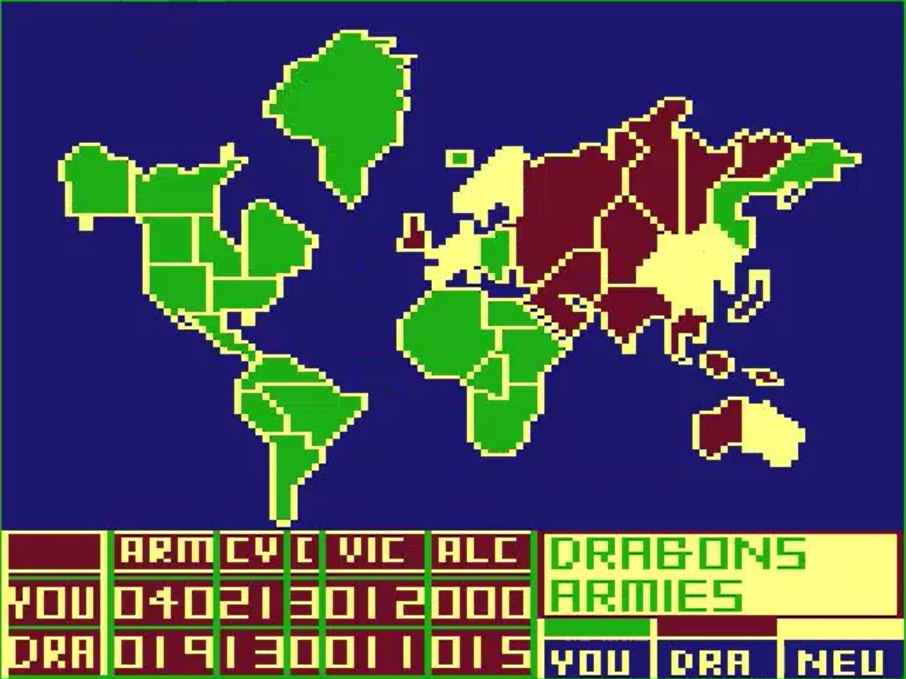
One turn later I am rolling into the Russian steppes…

The following turn Japan only escapes my embrace because, just like Greenland, nothing in the game tells you that you cannot reach Japan from Kamchatka. This game is not even a proper rip-off of Risk.

I correct the situation the following turn by attacking Japan from Mongolia in the following turn. After that, I seize the last Dragon Empire base in Western Australia and end the game.

It took me six turns to beat the computer at almost maximum difficulty. For reference I once won a physical four-player game of Risk in three turns, which I see as my personal record as far as boardgames, nay, the entire sphere of gaming is concerned – my friends never heard the end of it, nor will my daughters when they come of age – and now I found an opportunity to tell it to you, too, so thank you Empire!
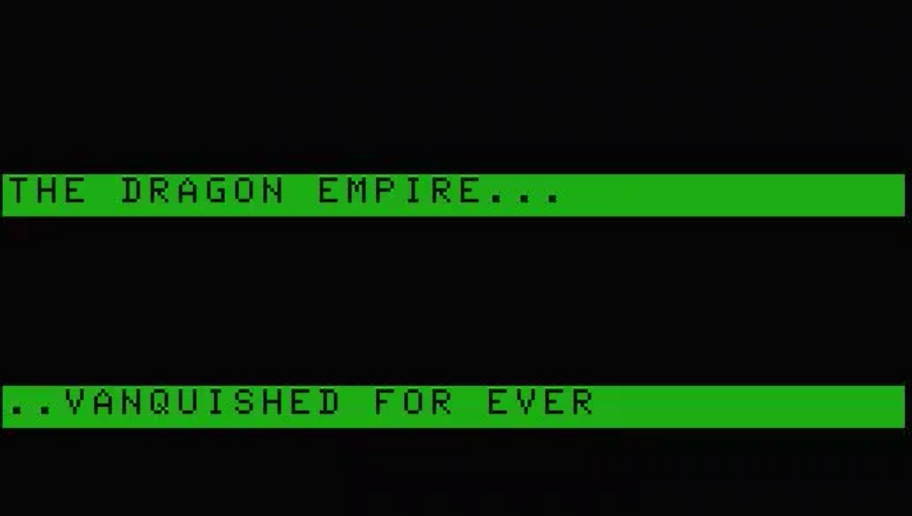
Ratings & Review
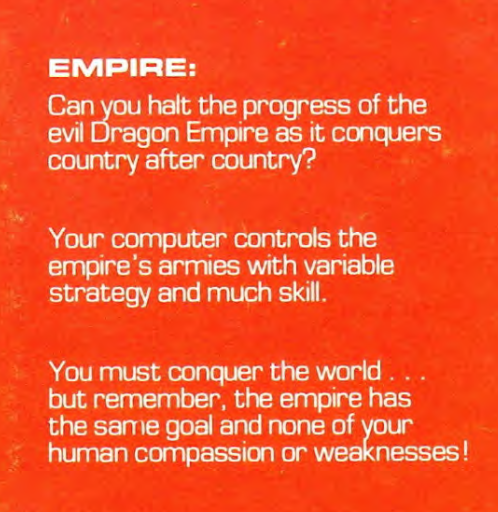
Empire, by Stephen Maltz, published by Shards Software, UK
Genre: Conquest
First release: June 1983 on Dragon 32/64
Average duration of a campaign: 1 hour
Total time played: 1 hour
Complexity: Trivial (0/5)
Final Rating: Totally obsolete
Ranking at the time of review: 110/111
Shards Software is a small British video game company founded in late 1982 in Ilford, Essex, by Stephen Maltz. Maltz, a systems analyst at Berger Paint, won an Inteltec Superbrain computer and a case of champagne in a 1980 competition where he had, and I have to quote Dragon User Magazine here, “to rank 10 different business computers in order of preference”. He learned to code on the Inteltec Superbrain, but then in summer 1982 acquired a Dragon 32 on which he started to code a series of games for kids. Ultimately, a compilation of those games (Shards’ Fun and Games) was the first product of Maltz’s new company.
The first half of 1983 was spent selling more family and light educational software, but then Maltz tested the water with more conventional games, first City Defense, a Missile Command-clone, and then later in the year two more games :
- Empire, which he had originally coded for himself on the Superbrain,
- Pettigrews Diary, an adventure game,
Empire was apparently successful, but the real banger was Pettigrews Diary, which sold upwards to 10 000 copies. This convinced Maltz to specialize in adventure games, with a few exceptions like the management game North Sea Oil. Alas for Maltz, he did not manage to reproduce Pettigrews Diary‘s success, and his later games sold on average 2000 copies according to the same Dragon User Magazine interview. This was not enough for a company which had by then increased in size, and the situation grew even worse in 1984 with the end of Dragon Data (the manufacturer of the Dragon 32/64). Shards Software released its last games in 1985 and seems to have fully disappeared by 1986.
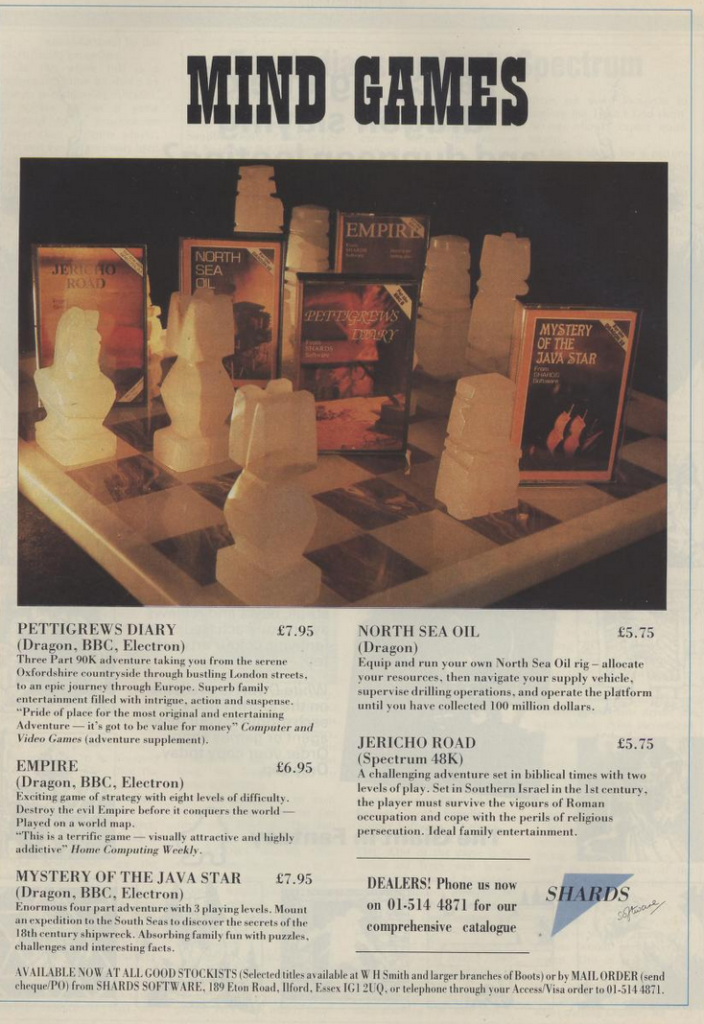
Empire was initially released on Dragon 32 (a compatible cousin of the TRS-80 Color Computer), hence the “Dragon Empire”, which later became the “Beeb Empire” when the game was ported on the BBC Micro and just the “Empire” when it was ported on Commodore 64.
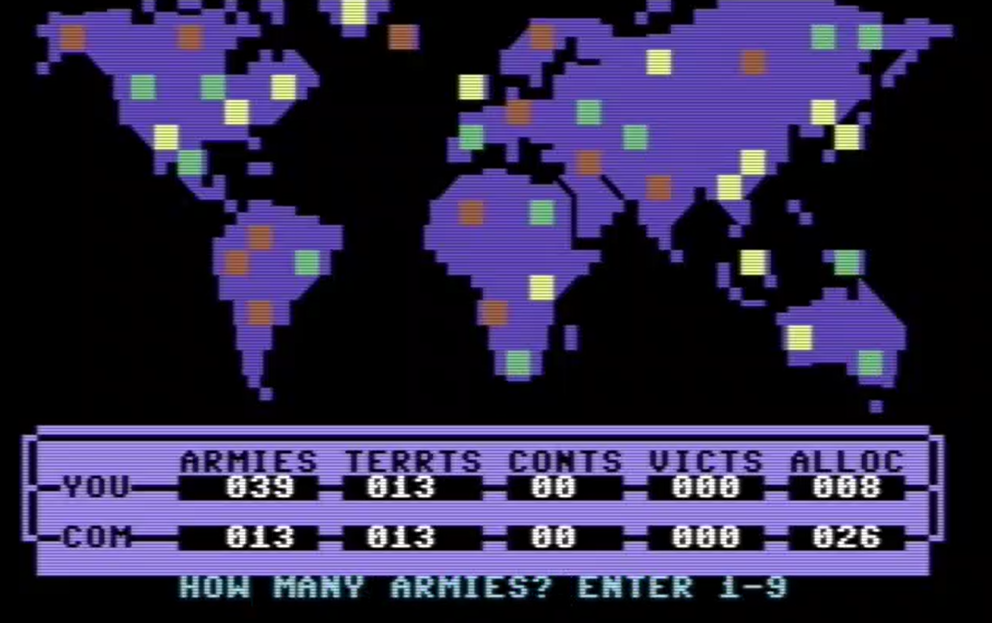
And now, the ratings:
A. Immersion: Terrible.
B. UI, Clarify of rules and outcomes: Terrible. You cannot navigate between territories in Empire. Instead, a “dot” passes from territory to territory and you must press <space> at the right moment to select, and this for every single action from initial territory choice to reinforcement, allocation or choice of target for an attack, and on all platforms. Incredibly frustrating. It made a session that should have lasted 15 minutes tops last almost one hour.
C. Systems: Terrible. It is Risk, and honestly I don’t find Risk very fun in the first place.
D. Scenario design & balancing: Terrible. The game uses the Risk map, but without Madagascar and after removing half the sea connections. They also removed some of the balancing: controlling Oceania gives as many reinforcement points as controlling Asia.
The AI is terrible and I knew I would win at the end of my first turn of my first game, at difficulty 6 out of 8.
E. Did I make interesting decisions? No.
F. Final rating : Totally obsolete. With an adequate UX, the game would have been mediocre but inoffensive and in the third quartile of my ranking. Alas, the time it takes to do anything in Empire is the extra touch that pushes it to the second-worst position in “order of preference” list. It is that bad.
Contemporary Reviews
Empire receives several surprisingly positive reviews, all of them covering the Dragon 32/64 version:
- Personal Computer News in November 1983 calls it “an extremely good game” giving it 5/5 in “playability”,
- Popular Computing Weekly in December 1983 calls the game “ideal as the winter nights draw in” and also, weirdly, “semi-educational” due to the “very good world map with close-up”. The “semi-” must be for the location of Iceland.
- Personal Computer World‘s review in January 1984 is mostly descriptive, but Empire received a 6/8 in the “addictive quality” and “value for money” categories – but 4/8 in “presentation” and “use of graphics“.
From those reviews, I reckon there are either more people than I imagined whose idea of a good time is a game of Risk, or more probably that the strategy offer on Dragon 32 was so meagre that anything available would be used for those winter nights. In any case, a sequel to Empire was announced in June 1984, and although it was never released it hints that the game was successful enough.
We have a few more games than expected before closing 1983, because as I was preparing my list for 1984 I found a few games that were actually published in 1983. Still, by the end of October we should be finally done!